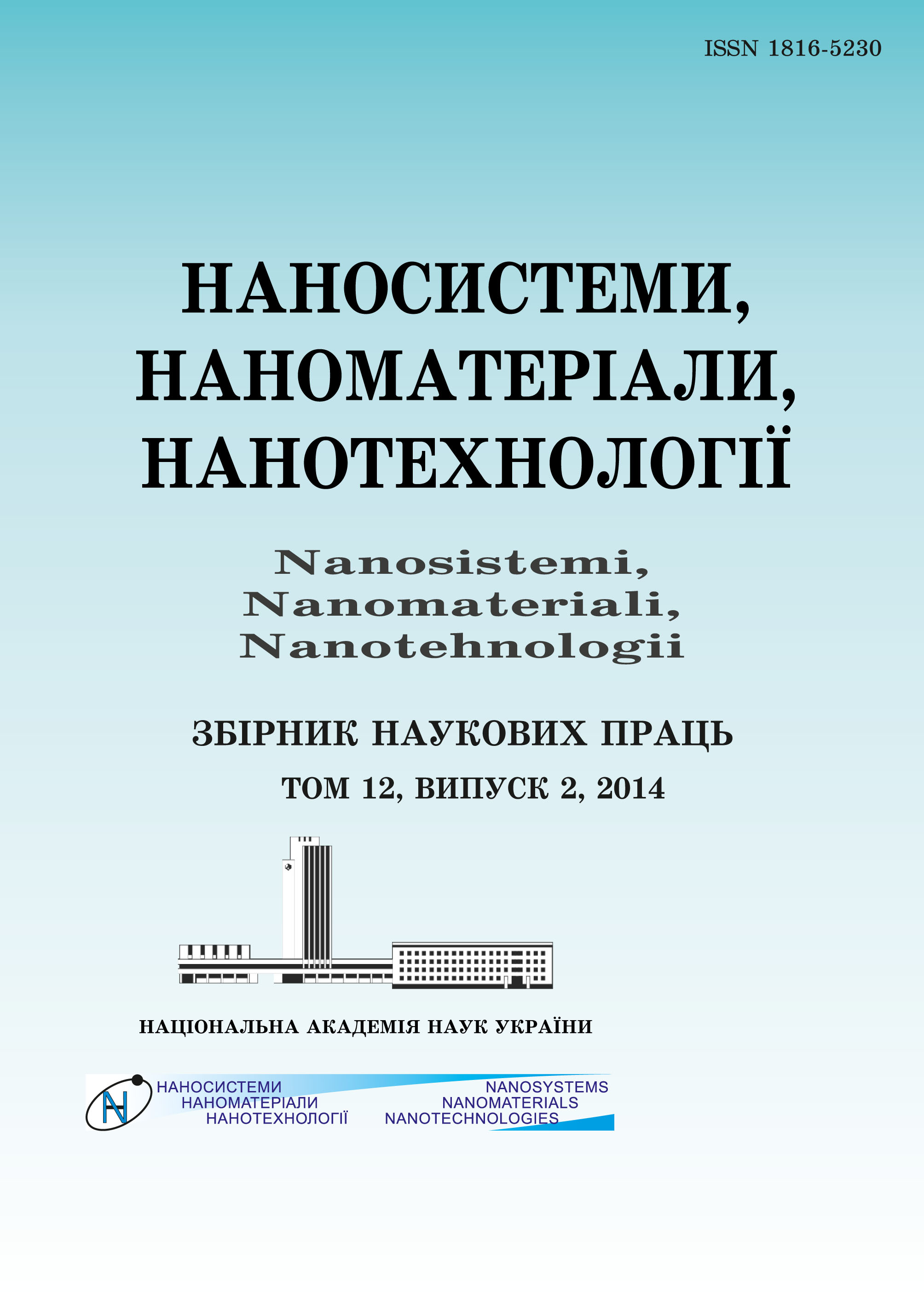|
|
|||||||||

|
Year 2024 Volume 22, Issue 2 |
|
|||||||
|
|||||||||
Issues/2024/vol. 22 /issue 2 |
|
HAMEED H. AHMED, ABDUALLAH M. ALI, and
AHMED N. ABD
Nanoparticles of Metal Oxide
(Bi2O3/PSi/n-Si) for Photovoltaic Applications
353–366 (2024)
PACS numbers: 68.37.Hk, 68.37.Ps, 72.40.+w, 78.30.Hv, 78.40.Ha, 78.67.Bf, 88.40.J-
Bismuth oxide (Bi2O3) nanoparticles are synthesized and evaluated for their function as materials for solar cells. Bi2O3 solution is inexpensively produced from the Nigella sativa seeds using a green synthetic method. The synthesized Bi2O3 solution is deposited by droplet casting method, and the synthesized nanofilm is dried at 80C. Subsequently, diagnostic tests such as UV–VIS, XRD, and FTIR are performed on the Bi2O3/glass thin films. By means of the SEM, EDS, AFM, and I–V characteristics in dark and under illumination, the optical and structural characteristics of Bi2O3-nanoparticle films are investigated to determine the optical energy gap and crystalline material. X-ray diffraction reveals the presence of a tetragonal crystal system in the phase. The estimated band-gap energy Eg is approximately Eg1 = 3.6 eV, and FTIR analysis shows the degree of infrared absorption as a function of wavelength to demonstrate the presence of functional groups in bismuth-oxide molecules from Bi–O bonds. SEM–EDS morphology studies examine the occurrence of nanocrystals of various shapes and sizes. Finally, as a bulk heterojunction device, the I–V performance of the solar cell (Ag/Bi2O3/PSi/Si/Ag) deserves attention, and a fill factor FF = 48 is found for a solar-cell efficiency of 2.8%, ideality factor beta = 1.35, characterization resistance RCH = 175 Ohm, and the parallel resistance = 25.14 Ohm•s. This cheap nanoparticle material could be an ideal candidate for future energy applications
KEY WORDS: biosynthesis, Bi2O3 nanoparticles, Nigella sativa, drop casting technique
DOI: https://doi.org/10.15407/nnn.22.02.353
REFERENCES
- T. M. Joseph, D. Kar Mahapatra, A. Esmaeili, L. Piszczyk, M. S. Hasanin, M. Kattali, J. Haponiuk, and S. Thomas, Nanomaterials, 13, No. 3: 574 (2023); https://doi.org/10.3390/nano13030574
- C. L. Keat, A. Aziz, A. M. Eid, and N. A. Elmarzugi, Bioresour. Bioprocess., 2, No. 47: 1 (2015); doi:10.1186/s40643-015-0076-2
- Yejun Qiu, Jie Yu, Xiaosong Zhou, Cuili Tan, and Jing Yin, Nanoscale Res. Lett., 4: 173 (2009); https://doi.org/10.1007/s11671-008-9221-6
- Zahrah Alhalili, Molecules, 28, No. 7: 3086 (2023); https://doi.org/10.3390/molecules28073086
- P. C. Nagajyothi, P. Muthuraman, T. V. M. Sreekanth, D. H. Kim, and J. Shim, Arabian Journal of Chemistry, 10, No. 2: 215 (2017); https://doi.org/10.1016/j.arabjc.2016.01.011
- L. Leontie, M. Caraman, M. Alexe, and C. Harnagea, Surface Science, 507–510: 485 (2002); https://doi.org/10.1016/S0039-6028(02)01289-X
- R. H. AL-Saqa and I. K. Jassim, Digest Journal of Nanomaterials & Biostructures, 18, No. 1: 165 (2023); https://doi.org/10.15251/DJNB.2023.181.165
- Simona Condurache-Bota, Bismuth Oxide Thin Films for Optoelectronic, and Humidity Sensing Applications (IntechOpen: 2018); doi:10.5772/intechopen.75107
- X. Y. Chen, H. S. Huh, and S. W. Lee, Journal of Solid State Chemistry, 180, Iss. 9: 2510 (2007); https://doi.org/10.1016/j.jssc.2007.06.030
- Z. Yang, S. Zhang, L. Li, and W. Chen, Journal of Materiomics, 3, Iss. 4: 231 (2017); https://doi.org/10.1016/j.jmat.2017.09.002
- T. P. Gujar, V. R. Shinde, C. D. Lokhande, R. S. Mane, and S. H. Han, Applied Surface Science, 250, Nos. 1–4: 161 (2005); http://dx.doi.org/10.1016/j.apsusc.2004.12.050?
- N. Motakef-Kazemi and M. Yaqoubi, Iranian Journal of Pharmaceutical Research (IJPR), 19, No. 2: 70 (2020); https://doi.org/10.22037%2Fijpr.2019.15578.13190
- H. Shirkhanloo, M. Safari, S. M. Amini, and M. Rashidi, Nanomedicine Research Journal, 2, No. 4: 230 (2017);? https://doi.org/10.22034/nmrj.2017.04.004
- V. Badescu, Comprehensive Renewable Energy (Ed. M. Trevor Letcher) (Elsevier: 2022), p. 256–292; https://doi.org/10.1016/B978-0-12-819727-1.00099-6
- R. H. Al-Saqa, I. K. Jassim, and M. M. Uonis, Ochrona przed Korozj?, 66, No. 8: 243 (2023); DOI: 10.15199/40.2023.8.3
- M. Rasheed, O. Y. Mohammed, S. Shihab, and Aqeel Al-Adili, J. Phys.: Conf. Ser., 1795: 012042 (2021); doi:10.1088/1742-6596/1795/1/012042
- S. S. Mali, P. Shinde, C. A. Betty, P. N. Bhosale, Y. W. Oh, and P. Patil, Journal of Physics and Chemistry of Solids, 73, Iss. 6: 735 (2012); https://doi.org/10.1016/j.jpcs.2012.01.008
- H. B. Hassan, H. M. Abduljalil, and A. Hashim, Nanosistemi, Nanomateriali, Nanotehnologii, 21, Iss. 2: 289 (2023); https://doi.org/10.15407/nnn.21.02.289
- Neha Sharma, Ankireddy Seshadri Reddy, and Kyusik Yun, Chemosphere, 32: 131029 (2021); https://doi.org/10.1016/j.chemosphere.2021.131029
- Edward Bormashenko, Yelena Bormashenko, and Mark Frenke, Materials, 12, Iss. 18: 3051 (2019); https://doi.org/10.3390/ma12183051
- H. H. Ahmed, A. M. Ali, and A. N. Abd, Journal of Biomechanical Science and Engineering, 3: 179 (2023); doi:10.17605/OSF.IO/TF5AP; https://www.researchgate.net/publication/370480788_Bi2O3_NPs_BIOSYNTHESIS_CHARACTERIZATION_AND_USING_FOR_SOLAR_CELL_APPLICATION
 This article is licensed under the Creative Commons Attribution-NoDerivatives 4.0 International License ©2003—2024 NANOSISTEMI, NANOMATERIALI, NANOTEHNOLOGII G. V. Kurdyumov Institute for Metal Physics of the National Academy of Sciences of Ukraine. E-mail: tatar@imp.kiev.ua Phones and address of the editorial office About the collection User agreement |